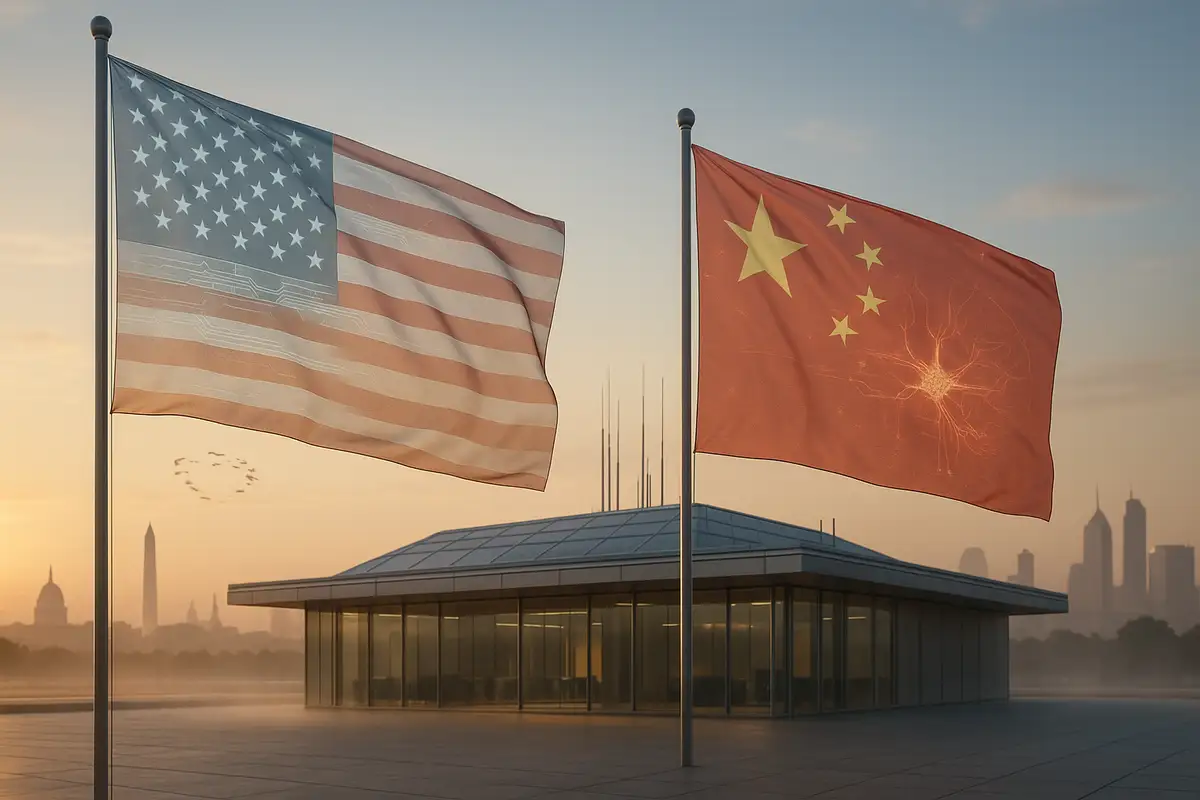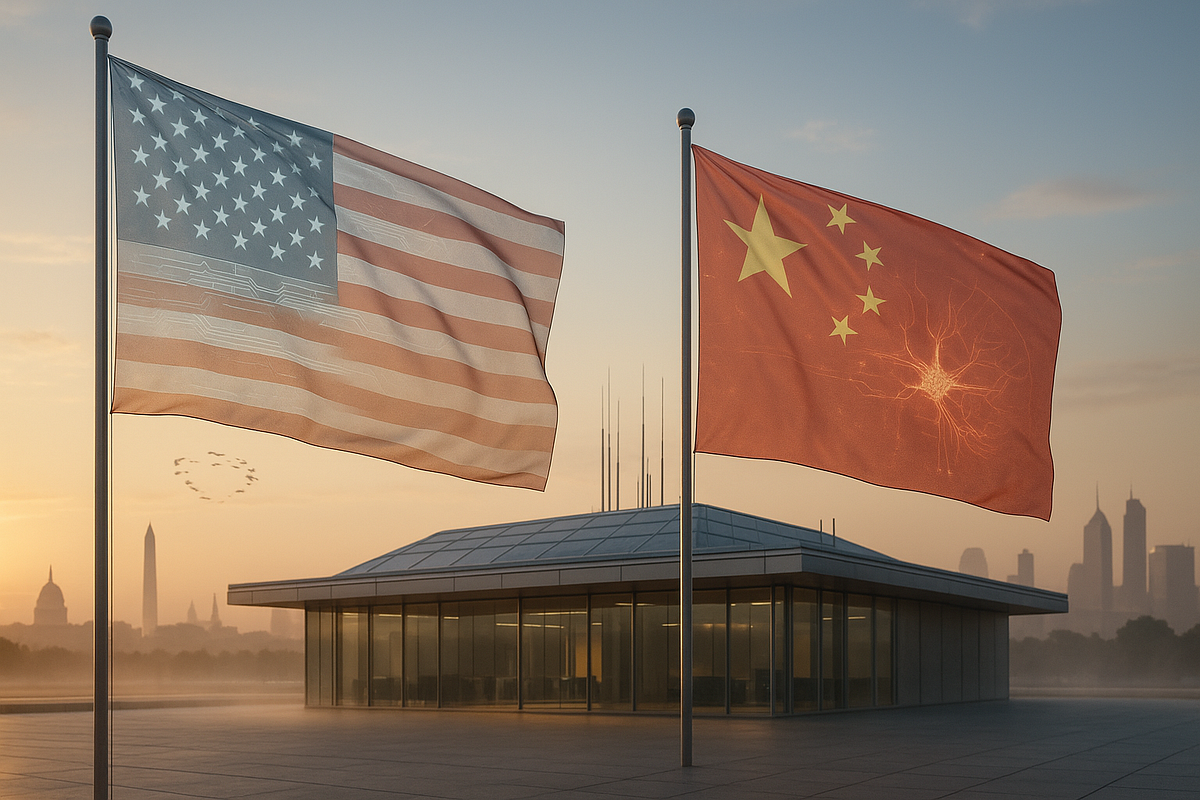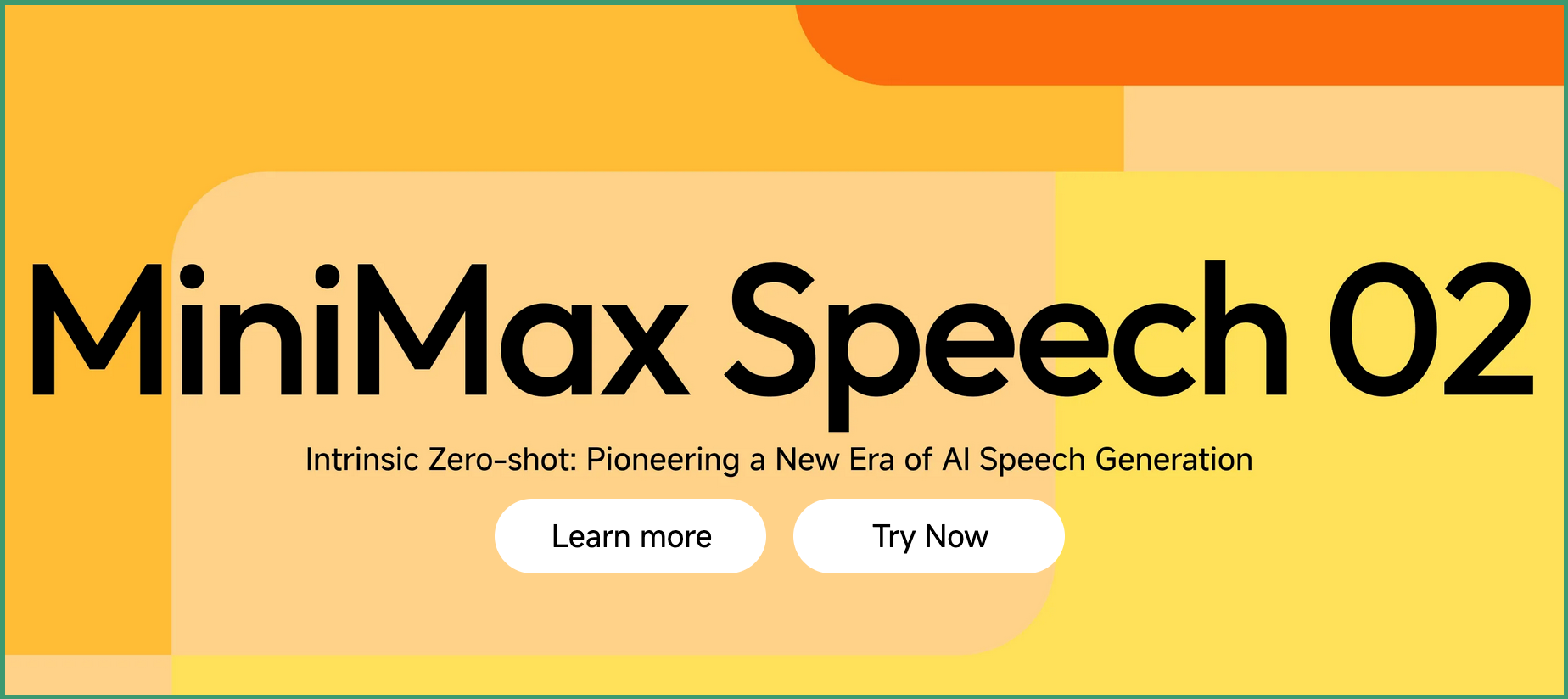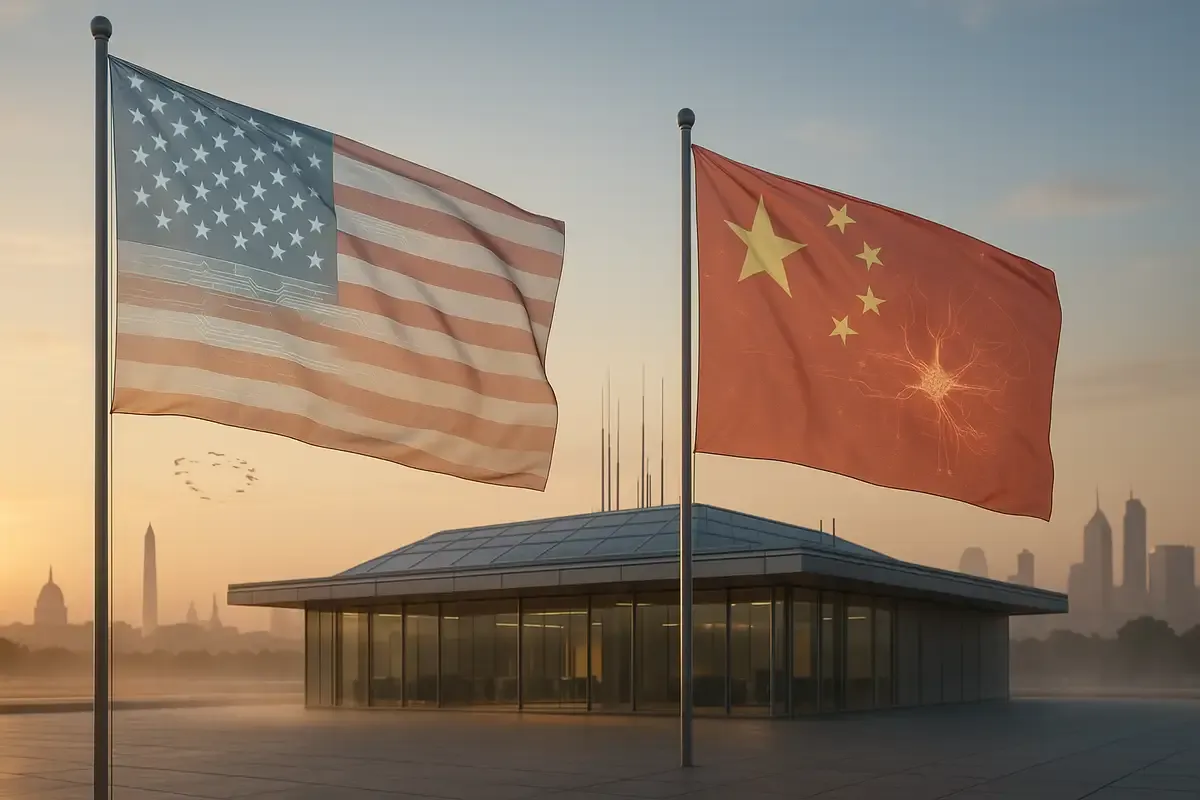Good Morning from San Francisco,
China spent $6 million to build what cost OpenAI hundreds of millions. 🤖 DeepSeek's breakthrough model just rewrote the AI competition rules. Beijing doubled down with $98 billion in spending 💰—dwarfing America's federal commitment by 50x. The chip war ended not with victory, but with Nvidia's CEO back on Chinese television praising "world-class models." ⚔️ Turns out efficiency beats brute force. 🏆
Stay curious,
Marcus Schuler
China's $98 Billion AI Bet Just Called America's Bluff

America's chip war against China officially ended in July 2025. Not with fanfare, but with Nvidia's Jensen Huang appearing on Chinese state television, praising the "world-class models" his company was once again allowed to sell chips to build.
The reversal came after China's DeepSeek shocked Silicon Valley by matching GPT-4's performance for just $6 million. OpenAI had spent hundreds of millions on similar results. The message was clear: you don't need the world's best chips to build the world's best AI.
China poured $98 billion into AI development in 2025—a 48% jump from the previous year. The government contributed $56 billion, roughly 50 times America's federal AI spending. Beijing's strategy worked. The performance gap between American and Chinese AI models shrunk to just 0.3%.
The Open Source Gambit
Chinese companies embraced a radical strategy: giving away their crown jewels. DeepSeek, Moonshot AI, and others released their best models for free. It's asymmetric warfare—turning hardware disadvantage into software advantage while building global influence.
The approach pressures American firms to cut prices and threatens their ability to recoup development costs. When equally good models are free, charging $20 monthly for ChatGPT becomes harder to justify.
Why this matters:
• China proved efficiency beats brute force—reshuffling the global AI map and opening doors for smaller nations
• The "managed competition" era begins, where neither superpower can dominate through technology alone


AI Image of the Day

Prompt:
picnic setup in French countryside, basket with baguette and wine, checkered blanket, lavender fields in background, clean black and white line art, coloring book style
How OpenAI Sprinted From Idea to 630,000 Pull Requests in 53 Days

A former OpenAI employee just pulled back the curtain on how the company actually works. The picture isn't what you'd expect from a 3,000-person organization.
OpenAI built Codex, its coding agent, in seven weeks. From first lines of code to full launch. The team worked nights until midnight, weekends included. Five engineers stayed until 4 AM the night before launch, then returned at 8 AM for the announcement.
The company operates entirely on Slack. No email exists. The employee received maybe 10 emails during their entire tenure. This creates chaos for some, productivity for others.
Growth has been explosive. The company went from 1,000 to 3,000 people in one year. Anyone with 12 months tenure ranks in the top 30%. Nearly every leader is doing a completely different job than two years ago.
The technical foundation is revealing. OpenAI uses a giant Python monorepo on Azure, mixing libraries from Google veterans with throwaway notebooks from new PhDs. GPU costs dwarf everything else - one niche Codex feature matched the employee's entire previous company infrastructure.
Results speak loudly. Codex generated 630,000 pull requests in its first 53 days. That's roughly 78,000 per engineer on the core team.
Why this matters:
• The seven-week sprint shows that massive scale doesn't have to kill startup speed - if you hire senior people and cut bureaucracy.
• OpenAI's "good ideas win" culture suggests the AI race will be won by execution, not planning committees.

🧰 AI Toolbox
How to Handle All Your Marketing in One Place

Simplified combines design, writing, video editing, and social media scheduling in one platform. Create graphics, write copy, edit videos, and schedule posts without switching between different tools.
Tutorial:
- Sign up for a Simplified account
- Choose templates for designs, copy, or videos
- Use AI tools to generate content and designs
- Work with team members in real-time
- Schedule social media posts directly from the platform
- Track how your campaigns perform with built-in analytics
- Use insights to improve your marketing strategy
Better prompting...
Today: Business Launch Legal Guid
I'm planning to start a [specific type of business, e.g., tech startup, consulting firm, e-commerce store] in [your state/country]. I need a comprehensive guide covering the key legal considerations, specifically:
Entity Formation:
- Comparison of business structures (LLC, corporation, partnership, etc.) for my situation
- Tax implications of each structure
- Steps for registration and required documentation
- Ongoing compliance requirements
Intellectual Property:
- What types of IP protection I should consider (trademarks, copyrights, patents)
- How to conduct IP searches and avoid infringement
- Timeline and costs for IP registration
- Employee/contractor IP assignment agreements
Additional Context:
- My business will [brief description of what you'll do]
- I'm a [beginner/have some experience] with business law
- My budget for legal setup is approximately [range]
- I plan to [have employees/work alone/have partners]
Please provide actionable steps with timeframes and highlight any areas where I should definitely consult an attorney versus what I can handle myself.
AI & Tech News
Pat Gelsinger Wants America to Copy China's State Investment Playbook
Former Intel CEO Pat Gelsinger argues America needs a sovereign-wealth fund to compete with China's state-backed tech investments in quantum computing, AI, and semiconductors. He says China's strategic capital deployment gives its companies unfair advantages while US firms rely on short-term private funding that can't match Beijing's long-term approach.
Chinese AI Startup MiniMax Files for $4 Billion Hong Kong IPO
Chinese AI startup MiniMax filed confidentially for a Hong Kong IPO targeting a valuation above $4 billion, with plans to raise up to $637 million before year's end. The company joins the first wave of Chinese AI firms seeking public listings as China's answer to ChatGPT, DeepSeek, sparked fresh investor interest in domestic AI products.
China Unleashes Army of Private Hackers on US Targets
China shifted from government-only cyberattacks to a hacking-for-hire system where private companies find software flaws, breach hundreds of targets at once, then sell access to multiple Chinese agencies. This new approach has more than doubled detected Chinese hacks and created a "significantly larger problem" with hundreds of victims instead of a few targeted strikes, according to US officials.
Microsoft Used Chinese Engineers on Pentagon's Most Secret Systems for Nearly a Decade
Microsoft used Chinese engineers to maintain the Pentagon's most sensitive computer systems for nearly a decade while top Defense officials remained completely unaware of the arrangement, according to a ProPublica investigation. The company created a workaround using $18-an-hour "digital escorts" - U.S. citizens who often lacked technical skills to detect malicious code - to supervise foreign engineers accessing military networks during Microsoft Teams calls.
Zuckerberg Builds Manhattan-Sized Data Centers Using Hurricane Tents
Meta plans to build data centers covering significant portions of Manhattan's footprint, with the first "Prometheus" supercluster coming online in 2026 using hurricane-proof tents instead of concrete buildings to speed construction. Zuckerberg is betting hundreds of billions from the company's $165 billion revenue stream on achieving "personal superintelligence" within 2-3 years, pursuing AI glasses that remember conversations you forgot rather than automating office work like competitors.
One in Five New Steam Games Now Admits to Using AI
Steam games using generative AI jumped from 1,000 to nearly 8,000 titles in a single year, with one in five new releases now disclosing they've enlisted robot help for everything from character voices to runtime gameplay. The voluntary disclosure system means the actual number of games secretly powered by AI is likely much higher, but at least 7% of Steam's library now admits to having artificial assistance.
AI Companies Break from Backstabbing to Warn: We're About to Lose Our Last Window Into Robot Minds
More than 40 researchers from OpenAI, Google DeepMind, Anthropic and Meta have stopped poaching each other's talent long enough to issue a joint warning that our brief window to monitor AI reasoning could close forever within years. Current AI models confess their misbehavior in readable internal thoughts, but advanced architectures could eliminate language-based thinking entirely, leaving humans completely blind to how AI systems make decisions.
Underground Mapping Firm Lands $96M to End Excavation Guesswork
Underground mapping startup Exodigo raised $96 million to show construction companies what's buried before they start digging holes. The company promises to save the industry from its $100 billion annual habit of excavating first and asking questions later.
🚀 AI Profiles: The Companies Defining Tomorrow

MiniMax: China's AI Companion King 🤖
MiniMax builds AI that actually talks back—and millions can't stop chatting. This Shanghai startup cracked the code on virtual companions while racing to become China's answer to OpenAI.
• The Founders
Founded December 2021 by SenseTime refugees led by Yan Junjie. The 100+ person team includes one-third PhDs who fled China's facial recognition giant to build something bigger. Based in Shanghai, because that's where China's AI tigers prowl.
• The Product
Multimodal AI models that generate text, images, video, and music. Talkie app hit #5 in US entertainment downloads—rare for Chinese software. Hailuo AI platform creates Hollywood-quality video from text prompts. Their MiniMax-M1 model devours 1 million tokens at once. Serves 157 million users across 200+ countries.
• The Competition
Fights China's "AI Tigers" (Zhipu, Moonshot, Baichuan) plus tech giants Baidu and Alibaba. Globally wrestles OpenAI, Anthropic, and Character.AI. Talkie briefly outranked Character.AI in US downloads—David meets Goliath with chopsticks.
• Financing
Raised $850M+ from China's power players. Alibaba led $600M Series B, Tencent and miHoYo also invested. Shanghai state fund just joined—now it's quasi-national champion. Hong Kong IPO targets $4B+ valuation, aiming for $510-637M raise.
• The Future ⭐⭐⭐⭐
Strong position despite brutal competition. Profitable consumer app funds expensive model training—smart flywheel. Hong Kong IPO provides war chest for global expansion. Geopolitical headwinds create challenges but also protection from US rivals in China's massive market.
Bottom line: MiniMax mastered AI companions while building serious foundation models. If they survive the coming consolidation, they'll be a global force.










